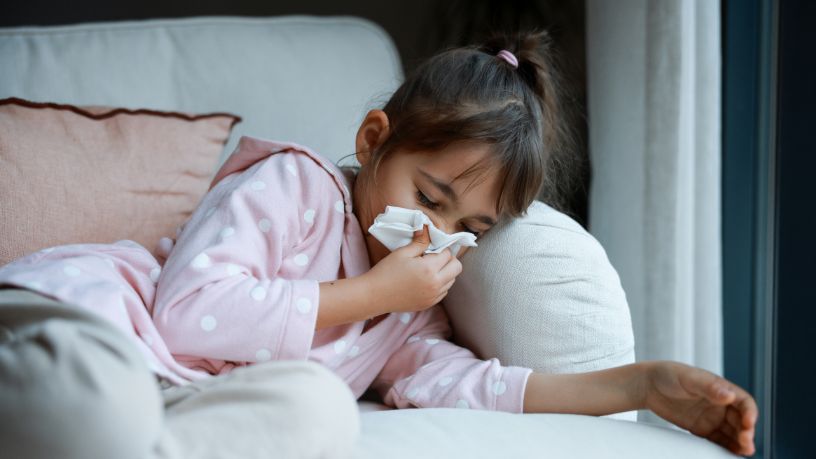The common cold and influenza (the flu) are both respiratory illnesses, but they are caused by different viruses.
On this page
Key takeaways
There is a vaccine available for the flu, but not for the common cold.
Cold symptoms are usually milder than flu symptoms, and don't last as long.
So, you feel tired, have a runny nose and a sore throat. But how do you know if it's a cold or the flu?
Colds and influenza (the flu) are both viral respiratory illnesses. However, they are caused by different viruses. More than 200 different viruses can cause a cold, while the flu is only caused by the influenza virus.
You know when you have the flu, says Bupa GP Dr Janice Tan.
"The main difference between a cold and the flu is the severity," explains Dr Tan. "Cold symptoms are usually mild, like a runny nose and sore throat, while the flu comes on suddenly with more intense symptoms, like high fever, body aches, and fatigue."
There is a vaccine available to reduce your risk of catching the flu, which also helps reduce the severity of symptoms.
Here's how to tell the difference between a common cold and the flu.
Symptoms of a cold
You know you're getting a cold when you get that twinge in the back of the throat, a stuffy or runny nose or sneezing.
"Colds tend to come on gradually, the symptoms are milder and don't last as long as flu symptoms," says Dr Tan.
Symptoms include:
- sneezing
- runny nose
- blocked nose
- fatigue
- mild fever
- cough
- sore throat.
"While uncomfortable, colds can be managed with rest, fluids, and over-the-counter (OTC) or home remedies."
Get chemist delivery
Bupa health insurance members can have prescriptions filled by local chemists and get them delivered to their door by registered couriers. You can also order over-the-counter goods. Delivery address must be within 8km of a participating pharmacy.
Symptoms of flu
"The flu typically hits suddenly, with intense symptoms like a high fever, chills, body aches, extreme fatigue, and a dry cough. It's much more severe than a cold and can leave you feeling wiped out for days," says Dr Tan.
These include:
- sore throat
- high fever
- headache
- cough
- achy body
- fatigue
- vomiting and diarrhoea.
Differences between a common cold and the flu
|
Symptom |
Colds |
Flu |
|
Fever |
Sometimes mild |
Often high |
|
Cough |
Common |
Common |
|
Sneezing |
Common |
Sometimes |
|
Sore throat |
Common |
Sometimes |
|
Fatigue |
Sometimes |
Common |
|
Body aches |
Rare |
Common |
|
Headache |
Sometimes |
Common |
|
Blocked or runny nose |
Common |
Sometimes |
|
Vomiting and diarrhoea |
Rare |
Common in children |
Is the flu dangerous?
The flu can lead to serious illness in some people, and result in potentially life-threatening complications.
High risk people include babies and young children, the elderly, pregnant people, Aboriginal and Torres Strait Islanders, and those with existing medical conditions (such as heart or lung conditions).
"It's particularly important vulnerable people are vaccinated against influenza every year," says Dr Tan.
Prevention against colds and flu
The flu vaccine lowers your risk of catching the flu and helps to reduce the spread. It also reduces your chances of experiencing severe symptoms or having serious complications.
It’s recommended that everyone over the age of 6 months gets a flu vaccine. It is safe for pregnant people at all stages of pregnancy.
“Getting your yearly flu vaccine is really important,” says Dr Tan. “Flu viruses change, so last year’s vaccine may not protect you from this year’s virus.”
The flu vaccine is free for people at high risk. This includes:
- Aboriginal and Torres Strait Islander people aged 6 months and over
- children aged 6 months to under 5 years
- pregnant people at any stage of pregnancy
- people aged 65 years or over
- people aged 6 months or over who have medical conditions that increase their risk.
How to reduce the spread of colds and flu
These tips could help you reduce your risk of catching or spreading viruses such as colds and influenza:
- Cough or sneeze into a tissue or your elbow to prevent the spread of germs. Throw away tissues straight after using them.
- Wash your hands regularly with soap and water. Make sure you do this after blowing your nose, coughing or sneezing.
- Always wash your hands before cooking, eating, or handling food.
- Stay at home as soon as you have flu symptoms.
Treatment for colds and flu
Antibiotics fight bacterial infections rather than viruses, so don't work against colds or flu.
Paracetamol or ibuprofen may help to reduce headaches, fever and muscle aches. Saline sprays or decongestants can help a blocked nose.
You can manage symptoms at home by:
- getting plenty of rest and staying away from work or school
- drinking lots of fluids, particularly water
- eating soft foods that won't irritate a sore throat.
Antiviral medications may be recommended for certain people with the flu, especially those who are at higher risk of complications. If taken within the first 2 days of symptoms, these medications may help reduce the length and severity of the flu.
Not everyone with the flu needs antivirals. Your GP can help decide if it's right for you.
"While both colds and the flu can be tough, remember that most people recover with plenty of rest and self-care," says Dr Tan.
"If you're feeling unwell, take it easy and trust your body to heal. If you're ever unsure, don't hesitate to reach out to your GP."
If you have a fever of 38°C or more that is not improving, or if you have trouble breathing, chest pain, or any other concerns about your symptoms, speak to your doctor.
Resources
Healthdirect provides free health advice and information, including a cold or flu symptom checker. Visit their website or call them on 1800 022 222.
The Department of Health and Aged Care has more information about the flu vaccination and who is eligible for free vaccines.

At Bupa, trust is everything
Our health and wellbeing information is regularly reviewed and maintained by a team of healthcare experts, to ensure its relevancy and accuracy. Everyone's health journey is unique and health outcomes vary from person to person.
This content is not a replacement for personalised and specific medical, healthcare, or other professional advice. If you have concerns about your health, see your doctor or other health professional.
You might also like...
Why get the flu shot?
Your annual flu jab can help reduce your risk of catching the virus and lower the severity of your symptoms if you do get it. Find out how it works.
The best flu treatments and remedies for winter
Flu symptoms can be debilitating, but an annual vaccination, certain medications and some tried and tested home remedies can help you get better faster.
5 remedies to help soothe a sore throat
Sore throats are a common problem, especially as the weather gets colder. But there are a few things you can do at home to help ease your symptoms.
Chest infection and cough: Home remedies to ease the pain
Chest infections (like bronchitis and pneumonia) can affect anyone at any age. We asked a GP what you can do to ease your symptoms at home.





